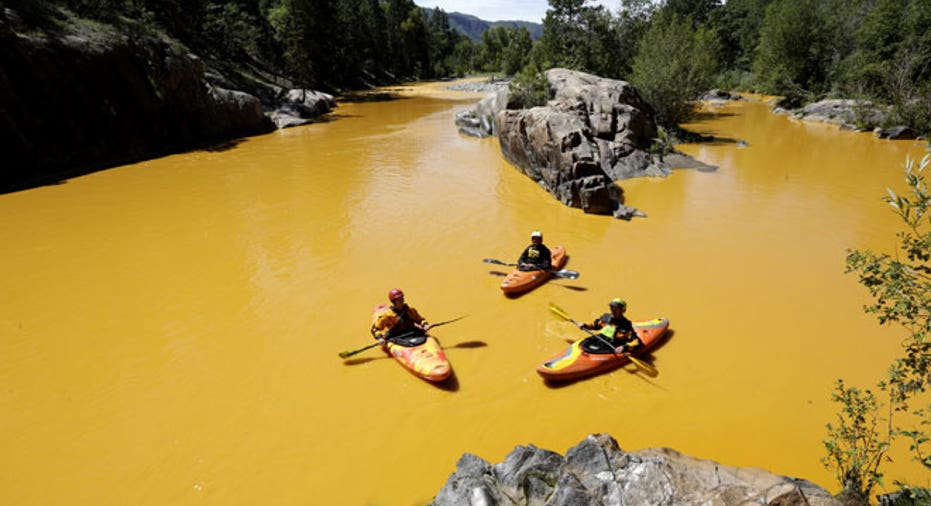Will EPA Get Same Treatment as Private Sector After Mine Spill?

The Environmental Protection Agency has come under mounting criticism over a large toxic spill that contaminated Colorado’s Animas River, impacting businesses and farmers in the surrounding area.
The mess began Aug. 5 when an EPA contractor was conducting a cleanup at the Gold King mine, which was abandoned in 1923. The crew accidently released 3 million gallons of wastewater containing lead, arsenic and other contaminants into the Animas River.
Gina McCarthy, the head of the EPA, visited southwest Colorado Wednesday and plans to be in New Mexico Thursday amid criticism over the agency’s response to the spill. The flow of wastewater was three times the EPA’s initial estimate.
So far, cleanup costs have surpassed $100 million, based on an estimate from the U.S. Geological Service. Costs associated with the cleanup and related damage fall on the EPA, although those funds may come from additional taxpayer money approved by Congress.
On Wednesday, McCarthy said water quality in the Animas River is back to “pre-event conditions.”
However, it could take months, even years, before officials determine the full extent of the damage. The mine water has spread beyond the Animas River to the San Juan River in New Mexico and Utah.
Business Impact
Farmers are still waiting for word that Animas River water is safe to use for irrigation. Business owners are feeling the immediate impact of the spill, too, saying tourism has taken a hit.
“The business interruption is real, and it’s been severe for the paddle-sports and rafting industries,” Andy Corra, co-owner of 4Corners Riversports in Durango, Colo., told the FOX Business Network. “We’re a tourist town, and we have several small companies that depend on their summer revenue and the tourists.”
Corra said the river returned to its natural color once the plume moved downstream, but he does not expect the river to be reopened until at least early next week.
“It’s been tough on small businesses. Basically, the rafting companies are shut down,” Corra added.
Who’s Responsible?
Normally, funds for dealing with polluted mines in Colorado come from bonds posted by each mining firm. The bonds cover potential cleanup costs, but numerous mines such as Gold King were abandoned decades ago. As a result, federal and state agencies have taken charge of dealing with those mines.
A Missouri-based EPA contractor, Environmental Restoration, was working on the Gold King mine when the spill occurred, according to The Wall Street Journal.
According to the Denver Post, the attorneys general of Colorado, New Mexico and Utah left open the possibility of filing a lawsuit against the EPA after the botched cleanup.
“Imagine what would happen if a private company caused this waste spill,” New Mexico Gov. Susana Martinez said in a statement last week.
Martinez added that the EPA “should demand the same of itself as it would of a private business responsible for such a spill.”
EPA vs. Private Sector
In 2009, Alaska Gold had to pay a $900,000 fine for polluting storm water, according to the EPA. Elgin Mining, a Canadian company, paid $3.2 million last year for alleged Clean Water Act violations that included destroying streams.
On a larger scale, Massey Energy was fined $20 million by the EPA in 2008 after mine runoff tainted waterways in West Virginia and Kentucky over the course of seven years. The company also promised to spend $10 million in cleanup costs and upgrades.
Massey Energy is the firm that owned the West Virginia mine where 29 miners were killed in an explosion in 2010. Massey Energy was later sold to Alpha Natural Resources, a coal producer that filed for bankruptcy in July.
The EPA’s largest-ever environmental fine was levied against BP, which recently agreed to pay $18.7 billion tied to the 2010 oil spill in the Gulf of Mexico.
Wilbur Ross, chairman of private equity firm WL Ross & Co., questioned whether the EPA and government officials will feel the same heat.
“I think there’s that good old saying, if you live in a glass house, you shouldn't throw stones. The EPA has been very good at throwing stones at private industry. It doesn't seem to be so good at managing its own affairs,” Ross said during a discussion on “Mornings with Maria.”
“If this was a private-sector company doing it, they’d be calling for the resignation of the CEO [and] they’d probably talk about bringing criminal charges. I bet nobody will lose their job over this.”



















